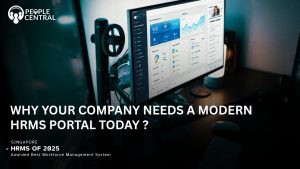Revolutionizing Employee Compensation with AI
As businesses evolve in the digital age, the integration of Artificial Intelligence (AI) into compensation management is transforming how organizations reward their employees. AI-Driven Compensation Management is not just a trend; it’s a strategic approach that empowers companies to tailor compensation strategies, enhance transparency, and drive engagement. This article explores the impact of AI on compensation management, its benefits, challenges, and how companies can navigate this revolutionary landscape.
AI-Driven Compensation Management: Redefining Rewards
Embracing AI in compensation management enables organizations to optimize their approach to rewards and recognition. The infusion of AI into compensation strategies results in a more dynamic, data-driven, and employee-centric framework.
Enhanced Compensation Personalization
AI analyzes a myriad of data points, including employee performance, market trends, and individual preferences, to tailor compensation packages. This personalization boosts employee satisfaction, as rewards align closely with their contributions and needs.
Market Intelligence for Competitive Packages
AI gathers real-time market data, allowing organizations to benchmark their compensation offerings against industry standards. This ensures they remain competitive, attracting and retaining top talent.
Data-Backed Decision Making
AI analyzes historical compensation data and identifies patterns that influence successful outcomes. This insight empowers HR professionals to make informed compensation decisions that drive desired employee behaviors.
The Benefits of AI-Driven Compensation Management
Implementing AI-Driven Compensation Management yields a plethora of benefits that enhance organizational efficiency and employee satisfaction.
1. Tailored Compensation Packages
AI personalizes compensation packages, improving employee retention and motivation.
2. Precise Market Alignment
Real-time market data helps businesses offer competitive compensation.
3. Efficient Resource Allocation
AI optimizes compensation budgets, ensuring fair distribution across the organization.
4. Enhanced Employee Engagement
Personalized rewards foster a sense of belonging and commitment among employees.
5. Informed Decision Making
Data-driven insights empower HR professionals to make strategic compensation decisions.
Challenges and Strategies in AI-Driven Compensation Management
While the benefits are promising, navigating AI-Driven Compensation Management requires addressing certain challenges.
1. Data Privacy and Security
Handling sensitive compensation data demands robust security measures and compliance with data protection regulations.
2. Algorithmic Bias
AI algorithms must be continually monitored and fine-tuned to avoid biased compensation decisions.
3. Change Management
Employees need to understand and trust AI-driven compensation decisions. Transparent communication is key to a smooth transition.
4. Data Accuracy and Integrity
Accurate and reliable data input is essential for AI to generate meaningful compensation insights.
5. Customization and Integration
AI systems should align with the organization’s unique compensation structure and seamlessly integrate with existing HR systems.
Expert Insights: The Future of Compensation
According to Dr. Sarah Bennett, an HR technology expert, “AI-Driven Compensation Management is a paradigm shift in how organizations reward their employees. It combines data-driven precision with personalization, creating a new standard of fairness and engagement.”
Pioneering the Future of Compensation
AI-Driven Compensation Management transcends traditional reward systems. By integrating AI, organizations can unlock the potential of personalized, data-driven compensation strategies that resonate with employees. As the future of work evolves, companies that harness the power of AI in compensation management will lead the way in fostering employee satisfaction, engagement, and organizational success.
FAQs
Ques 1. How does AI personalize compensation packages?
Ans 1. AI analyzes performance, preferences, and trends to tailor compensation packages.
Ques 2. Can AI help organizations remain competitive in compensation offerings?
Ans 2. Absolutely. AI gathers real-time market data to ensure compensation remains competitive.
Ques 3. What is the role of AI in decision-making for compensation?
Ans 3. AI analyzes historical data to identify patterns, empowering HR professionals to make informed decisions.
Ques 4. How can organizations address algorithmic bias in AI-driven compensation?
Ans 4. Regular monitoring and fine-tuning of algorithms are essential to mitigate biases.
Ques 5. What challenges should organizations consider when implementing AI in compensation management?
Ans 5. Challenges include data privacy, algorithmic bias, change management, data accuracy, and customization.








 5
5


























